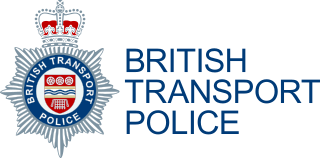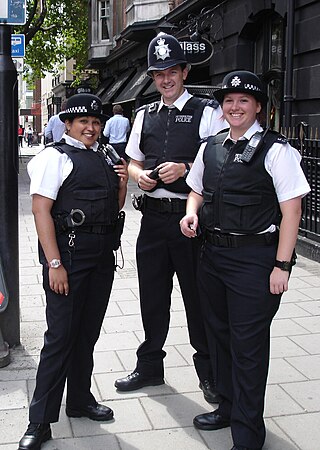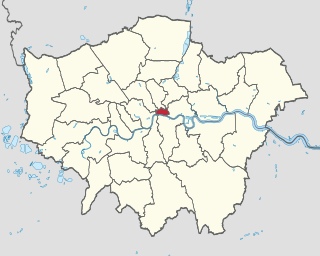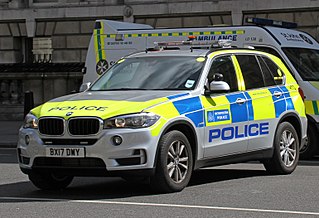
The Metropolitan Police Service (MPS), formerly and still commonly referred to as the Metropolitan Police, is the territorial police force responsible for law enforcement and the prevention of crime within the ceremonial county of Greater London. In addition, it is responsible for some specialised matters throughout the United Kingdom, including national counter-terrorism measures and the protection of specific people, such as the monarch and other members of the royal family, members of the government, and other officials.

British Transport Police is a national special police force that polices the railway network of England, Wales and Scotland. The force polices more than 10,000 miles of track and more than 3,000 stations and depots.

Law enforcement in the United Kingdom is organised separately in each of the legal systems of the United Kingdom: England and Wales, Scotland, and Northern Ireland. Most law enforcement duties are carried out by those who hold the office of police constable of a territorial police force.

The City of London Police is the territorial police force responsible for law enforcement within the City of London, England, including the Middle and Inner Temples. The force responsible for law enforcement within the remainder of the London region, outside the city, is the much larger Metropolitan Police, a separate organisation. The City of London, which is now primarily a financial business district with a small resident population but a large commuting workforce, is the historic core of London, and has an administrative history distinct from that of the rest of the metropolis, of which its separate police force is one manifestation.

The Serious Organised Crime Agency (SOCA) was a non-departmental public body of the Government of the United Kingdom which existed from 1 April 2006 until 7 October 2013. SOCA was a national law enforcement agency with Home Office sponsorship, established as a body corporate under Section 1 of the Serious Organised Crime and Police Act 2005. It operated within the United Kingdom and collaborated with many foreign law enforcement and intelligence agencies.

An authorised firearms officer (AFO) is a British police officer who is authorised and trained to carry and use firearms. The designation is significant because most police officers in the United Kingdom do not routinely carry firearms. The only forces where officers are routinely armed are the Police Service of Northern Ireland, the Ministry of Defence Police, the Civil Nuclear Constabulary, Belfast Harbour Police and the Belfast International Airport Constabulary.
The Association of Chief Police Officers of England, Wales and Northern Ireland (ACPO) was a not-for-profit private limited company that for many years led the development of policing practices in England, Wales, and Northern Ireland. Established in 1948, ACPO provided a forum for chief police officers to share ideas and coordinate their strategic operational responses, and advised government in matters such as terrorist attacks and civil emergencies. ACPO coordinated national police operations, major investigations, cross-border policing, and joint law enforcement. ACPO designated Senior Investigative Officers for major investigations and appointed officers to head ACPO units specialising in various areas of policing and crime reduction.

An armed response vehicle (ARV) is a type of police car operated by police forces in the United Kingdom. ARVs are crewed by authorised firearms officers (AFOs) to respond to incidents believed to involve firearms or other high-risk situations. ARVs are specially adapted and modified to accommodate specialist equipment.
The Specialist, Organised & Economic Crime Command is a unit within the Gangs and Organised Crime group of Specialist Crime & Operations within London's Metropolitan Police Service. The unit's main responsibility is to both investigate and take steps to prevent fraud, along with a wide range of other fraudulent crimes which require specialist knowledge and training to investigate. The unit was previously known as the Fraud Squad, or by its previous Specialist Operations designation, SO6.
A firearms unit is an armed unit within each territorial police force in the United Kingdom. For the most part, the police forces of the United Kingdom are unarmed; however, all have firearms units to provide the police force with the capability to deal with terrorists and armed criminals. A police officer cannot apply to join the firearms unit without first finishing their two-year probationary period, with a further two years in a core policing role for some forces. Firearms unit is the most common name outside of the capital, while that of London's Metropolitan Police Service is called the Specialist Firearms Command, Trojan or SC&O19. Within the media it is sometimes compared to the SWAT units of the United States.
In the United Kingdom police firearm policy varies by constituent countries. In Northern Ireland, all police officers carry firearms whereas in the rest of the United Kingdom, firearms are carried only by specially-trained firearms officers. The arming of police in Great Britain is a much debated topic.
A specialist firearms officer (SFO) is a British police officer who has undergone training in the use of police firearms to a more advanced level than authorised firearms officers (AFOs). SFOs receive additional training in areas such as building assault and specialist weapon usage. The common role of an SFO is to assault premises involved in a siege situation, effect high-risk firearms related arrests and respond to terrorist threats.
A police area is the area for which a territorial police force in the United Kingdom is responsible for policing.

The Metropolitan Police of Greater London, England is organised into four main directorates, each with differing responsibilities. These are Frontline Policing, Met Operations, Specialist Operations, Professionalism and six civilian staffed support departments under the umbrella of Met Headquarters. Each is overseen by an Assistant Commissioner, or in the case of a support department a director of police staff which is the equivalent civilian grade.

The National Crime Agency (NCA) is a national law enforcement agency in the United Kingdom. It is the UK's lead agency against organised crime; human, weapon and drug trafficking; cybercrime; and economic crime that goes across regional and international borders; but it can be tasked to investigate any crime. The NCA has a strategic role as part of which it looks at serious crime in aggregate across the UK, especially analysing how organised criminals are operating and how they can be disrupted. To do this, it works closely with regional organised crime units (ROCUs), local police forces, and other government departments and agencies.
The National Domestic Extremism and Disorder Intelligence Unit is a national police unit of the National Police Chiefs' Council within the Metropolitan Police Service Specialist Operations Group.
The National Cyber Crime Unit (NCCU) is a command of the United Kingdom's National Crime Agency. With the creation of the National Crime Agency in 2013, the unit was formed following the merge of the Serious Organised Crime Agency's cyber division with the Police Central E-Crime Unit (PCeU) of the Metropolitan Police Service, and is one of four current commands which look at the growing use of cybercrime and ways to identify it.
The National Police Chiefs' Council (NPCC) is a national coordination body for law enforcement in the United Kingdom and the representative body for British police chief officers. Established on 1 April 2015, it replaced the former Association of Chief Police Officers (ACPO), following the Parker Review of the operations of ACPO.

A Counter Terrorist Specialist Firearms Officer (CTSFO) is a United Kingdom police firearms officer. The CTSFO standard is the highest Authorised Firearms Officer level in the National Police Firearms Training Curriculum (NPFTC) and was established by the Metropolitan Police Service in the lead up to the 2012 Summer Olympics held in London on 27th of July. The firearms units of police forces organise CTSFOs into teams to establish a police tactical unit.








